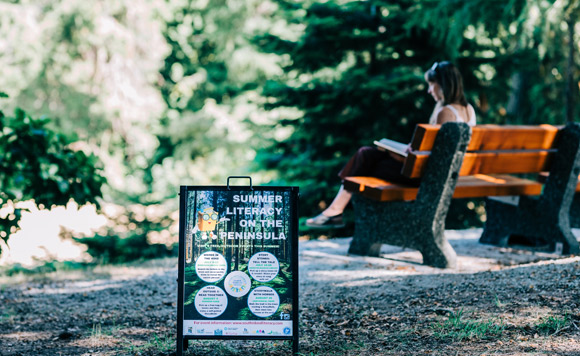by Deborah Rogers | photo by Janis Jean Photography
Back when Gordon Campbell was Premier, one of the goals in his government’s Strategic Plan was to “make B.C. the best-educated, most literate jurisdiction on the continent.” Funds were made available to task groups that would enhance literacy – not just through formal education, but also through community groups and not-for-profits. There is a Provincial Literacy Organization, Decoda, that looks for funding, and it gets filtered down to libraries, adult education and also to locally fund a paid representative, a “Literacy Coordinator.” That’s who I met to get the Behind the Scenes scope on Saanich Peninsula Literacy.
Shantael Sleight has been in the role for several years, having previously been the Literacy Coordinator for the Westshore. Many of the programs and project ideas are similar between the two districts, but Shantael notes the distinctly different community and population on the Saanich Peninsula. When literacy is talked of we often think about children and their achievements at school, but literacy is much bigger than that. To thrive in the world you need to be literate: to be able to understand, and to participate.
A large part of Shantael’s role is to facilitate conversations and connections. There’s a multi-partner task force that meets four times a year, bringing insight from their different organizations. This includes schools and libraries, but also the Shoal Centre, the University of Victoria, municipal councillors and cultural groups like Sidney Litfest. The diversity of views allows literacy needs in the community to be assessed and then fresh ideas to reach those audiences are tested out.
That brings us to Saanich Peninsula Summer Literacy Programs. In the past there has been a very popular outdoor library held through the summer. Entirely free and accessible it allowed children and adults to connect, read together and experience storytelling and song. These types of events are access points for literacy: for kids they are entertainment, and hopefully spark or deepen a lifelong love of reading; for their family members it can be an opportunity to access services they didn’t know existed. Or it can start a conversation about literacy skills, perhaps even highlight areas that need support.
I wondered why we need these outreach projects; surely the work of imparting literacy skills should happen in our education system? But of course it’s not as straightforward as that. Shatael reminded me that one institution cannot provide everything, and often there are whole sectors of a society that miss out with that approach. She explained further: “Literacy affects everyone – from babies and toddlers as they are first introduced to books, to adults as they continue learning throughout their lifetimes. Investing in literacy benefits not only individuals, but the whole community. Through a Community Development approach, we strengthen individuals and groups by providing resources and supporting skill development needed to adapt and grow.”
This summer, instead of the Outdoor Library, Saanich Peninsula Literacy has a series of events planned. They started with “Words in the Wind,” a scavenger hunt in Dominion Brook Park that required the public to find hand-painted letters hanging in the trees and fit them together to form a phrase. Then there’s “Head Outside & Read,” which takes place at Pioneer Park in Brentwood Bay on August 5. There will be books handed out and spaces for people to read together. Finally, there’s a “StoryWalk® with the Horses” taking place on August 26 at Centennial Park. A story walk is a way to read or hear a story whilst taking a walk. A book is taken apart and the laminated pages displayed along a route. The horses come at the end in a nice collaboration with the Victoria Therapeutic Riding Association.
Saanich Peninsula Literacy is not so much an organization as an initiative. Long term, they hope that individuals will have gained the skills they need to participate in their community and ultimately that means they will feel like they belong. Provincially, September is designated as “Literacy is Life” month and I really believe in that message. It’s incredibly isolating not to be able to understand documentation, signage, emails, video captions and all the ways that text is inserted into our daily lives. You don’t have to love reading stories to benefit from sharpened literacy skills – but they are the tools to open doors to the wider world.




